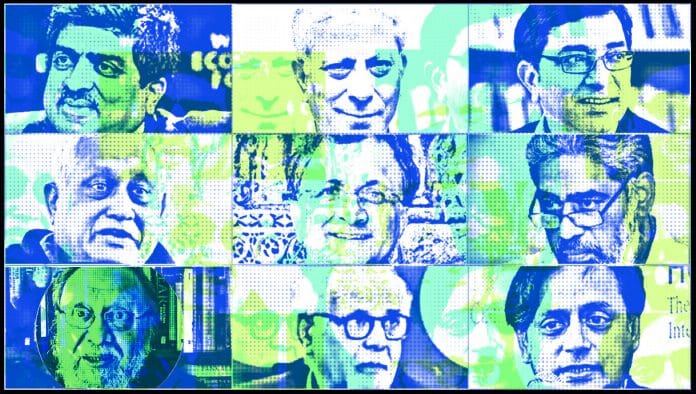All the women we approached said no, while very few men did that – all for their individual reasons.
New Delhi: Several people have questioned why ThePrint list of the next-generation of Indian intellectuals published Wednesday does not have a single woman intellectual identifying her picks.
As the senior editor who anchored the project, let me answer that: We did try to get women on the list.
We spoke to several women in the fields of history, the liberal arts and economics. Each one of them said no. Some of them referred to the pressure of time, some said they weren’t interested, others said they “would think about it and get back”.
Since we respect their privacy, and their reasons for refusal, ThePrint has decided not to name these individuals.
But when ThePrint team called them back, the last category of women said they had “considered and rolled over” the request in their minds and decided “to pass” – meaning, they were not going to give us the three names we had requested for our list, or the two-line reasons why they were recommending them.
It was interesting that ALL the women said no. We asked them why. We even went beyond our call of duty to say that it was surprising that so many women had turned down our request, while very few men did so.
“We don’t believe in naming individuals. Our work is a team effort, a collective responsibility, in which the whole is more than the sum of its parts,” one woman intellectual said.
“We would rather talk about institutions and organisations which have pushed women to speak up, stand up. It is institutions that have shaped public discourse rather than personalities,” she said.
Another pointed out that “it would be unfair to name just three women, when there are hundreds who are equally deserving”.
A third said, “I simply don’t believe in lists because it singles only a few people out.”
To be fair, some of the men we spoke to were also reluctant to recommend only three names. A couple simply listed out their recommendations but didn’t offer reasons.
So, do the anecdotal refusals on the part of the women we got in touch with signify something broader and bigger? Has ThePrint stumbled upon something still vague, ambiguous and indeterminate, but nevertheless meaningful, and perhaps, even far-reaching?
Perhaps, and perhaps not. ThePrint wasn’t attempting to find out if women think differently from men, nor were we trying to be politically correct by “balancing” gender, caste, religion, region etc to arrive at ‘A Perfect List’. In fact, we didn’t think it necessary to do so because such exercises cannot always be aligned along caste, religion or gender lines.
Maybe the refusal to speak out points to the fact that women would far rather speak from the shadows, than demand the limelight. That women are far more comfortable with consensus than individuality. That women would rather look for the common good, where all boats must rise, than a triumphal but incandescent single straight shot to stardom.
This fear of “being singled out” is more than real. Why would women want to be noticed when the consequences can be both unpredictable and fearful?
Of course, there are enough examples across the board that disprove each of the sentences above. And yet, there’s something about women preferring to huddle together, much like a football team, rather than shining on separately like crazy diamonds.
Enough said. Thank you, each one of you dear readers, for reading ThePrint’s ‘next-generation of intellectuals’ list so carefully. And for the valuable feedback.
From all of us at ThePrint, season’s greetings!







This explanation is even worse than the original article. You have 17 male nominators listed in the original article, and you say a few turned you down. So you approached 20 men, and 6 women. Instead of apologizing for your laziness, you are now making it even worse by coming up with sexist reasons why your laziness is not to blame.
I am glad at the attempt to explain gender bias. The absence of ‘minorities’: in the selection panel of The Print list militates against the politics of inclusivity one would expect of such an endeavour. Its not too much to have expected a more robustly inclusive selection criterion. Many of the nominators could well be patrons with old boy networks, and all of us are somehow or other either co-opted into it or choose our own networks to enhance our social cultural capital.
Might the editors follow up with an explanation on how the ‘nominators’ were chosen? Was there a criteria for who could be a nominator?
Eh you didn’t discover anything vague, ambiguous, indeterminate, meaningful or far-reaching, you were just too late and lazy to keep calling women. Feminist journalism takes time, effort and patience. And care.
so much BS in one article.
And what about Dalits and minorities, tribals? Did you ask them about their powerful intellectuals?
That is because ALL women are mothers deep down, so when they are asked to choose from their flock or any group they may have a power to choose from, their instinctive benevolence pushes them to treat all as equal.
Another instinct that would produce the same end result, of not indicating any preferences, would be an over critical nature — “all are useless”, sort of a thing. Not ALL women can be suspected to have that nature.
Seasons Greetings to you too Jyoti ji, and to all at The Print.
Think of some of the most powerful / influential women in public life, in India and abroad. How many of them have honestly stretched out a little, to give women an extra push, mentor them individually or advance their rights in general. The columnist and I are being politically correct by not analysing too deeply the refusal of so many women to honour younger colleagues by singling them out for praise and distinction. However, it does not give a good feeling.